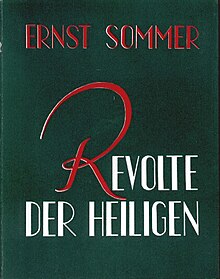Ernst summer
Ernst Sommer (born October 29, 1888 in Iglau , Austria-Hungary ; died October 20, 1955 in London ) was an Austrian- Czechoslovakian writer and journalist . He is attributed to Bohemian Judaism, wrote in German and professed Czechoslovak citizenship. After initially writing expressionist prose, from the 1930s onwards he mainly wrote historical novels . His novel Revolte der Heiligen (1944) about Jewish resistance in a concentration camp is one of the most important works of exile literature .
life and work
Ernst Sommer was the son of a Jewish factory owner from Moravia. After graduation in Jihlava he began a study of 1,907 Medicine at the University of Vienna and moved to a semester of law . In 1912 he received his doctorate in law. His first novel was published in the same year . During these years, Sommer was close to the “ Prague Circle ” around Max Brod and Franz Kafka . From 1912 to 1914, Sommer completed his judicial year at the District and District Court in Iglau . He then worked in 1914 as a " trainee lawyer" with a Viennese criminal defense attorney. After holding a position at the Lower Austrian Chamber of Lawyers for a short time, Sommer worked in Aussig / Elbe , Brüx and Dux . In September 1915 he was called up and during the First World War he was apparently deployed to the front and to a court martial in Felixdorf , Upper Austria .
From 1920 Ernst Sommer practiced as a lawyer in Karlsbad . He wrote essays in which he dealt with Jewish questions, the expressionist grotesque The Case of District Judge Fröhlich (1922) and The Simulant (1920). In 1924 he published the magazine Die Provinz together with Bruno Adler . In addition, he was politically active as a member of the Social Democratic Party and member of the city council . Sommer dealt intensively with questions of cultural policy, in particular with German-Czech understanding. In the 1930s, Sommer, who had worked as a theater critic since 1928 , began writing historical novels . In novels such as The Templars (1935) and Message from Granada (1937), he dealt critically with current events, the totalitarian striving for power, the demagogic unleashing of the masses and the persecution of the Jews.
After the Munich Agreement was signed in 1938 , Sommer, who had campaigned against National Socialism at an early age , fled to Prague and finally to Great Britain in November 1938 . His mother committed suicide in the Theresienstadt concentration camp in 1942 , and his sister Antonia Grünberger was murdered in the Auschwitz concentration camp in 1944 .
Sommer worked for a law firm in London . During the Second World War he supported the Czechoslovak government in exile as a journalist and was involved in the exile press. His story Die Gaskammer from December 1942 is one of the first literary works on the Holocaust . His internationally most successful novel Revolte der Heiligen (1944) portrayed Jewish resistance in a German concentration camp . After the end of the war, Sommer published a number of other novels in German, in which he dealt with fates in exile ( Villon , 1949) and historical figures such as Thomas Müntzer and Ulrich von Hutten . He traveled to Prague in 1946 and 1947 ; the attempt at a permanent return to Czechoslovakia failed, however. Sommer took British citizenship in 1951 and died in exile in London, where he had continued to work as a lawyer.
Works

- Gideon's excerpt , Vienna 1913
- Der Aufruhr , Vienna [u. a.] 1920
- The case of District Judge Fröhlich , Reichenberg, Northern Bohemia, 1922
- The Templars , Berlin 1935, new edition Wuppertal 2018
- Embassy from Granada , Moravian-Ostrava (among others) 1937
- Revolt of the Saints , México 1944
- Thomas Münzer's broadcast , Berlin 1948
- Blackmailer from aberration , Vienna 1949
- Villon , Berlin 1949
- The Fraulein von Paradis , Nuremberg 1951
- Doctor Rabelais , Nuremberg 1953
- Antinous or The Journey of an Emperor , Rudolstadt 1955
- Life is abundance, not time , Berlin 1955
- Der Aufruhr and other selected prose , Wiesbaden 1976
literature
- Věra Macháčková-Riegerová: Ernst Sommer . Prague, 1969
- Margarita Pazi : Five authors of the Prager Kreis , Frankfurt am Main, 1978
- Stefan Bauer: A Bohemian Jew in Exile , Munich 1995
- Christoph Haacker: Summer, Ernst. In: New German Biography (NDB). Volume 24, Duncker & Humblot, Berlin 2010, ISBN 978-3-428-11205-0 , p. 565 f. ( Digitized version ).
- Summer, Ernst. In: Lexicon of German-Jewish Authors . Volume 19: Sand – Stri. Edited by the Bibliographia Judaica archive. De Gruyter, Berlin a. a. 2012, ISBN 978-3-598-22699-1 , pp. 280-284.
- Andreas Herzog: Summer, Ernst. In: Andreas B. Kilcher (Ed.): Metzler Lexicon of German-Jewish Literature. Jewish authors in the German language from the Enlightenment to the present. 2nd, updated and expanded edition. Metzler, Stuttgart / Weimar 2012, ISBN 978-3-476-02457-2 , p. 470f.
Web links
- Literature by and about Ernst Sommer in the catalog of the German National Library
| personal data | |
|---|---|
| SURNAME | Summer, Ernst |
| ALTERNATIVE NAMES | Simm, Erich (pseudonym); Morse, Max (pseudonym) |
| BRIEF DESCRIPTION | Czechoslovakian writer German language |
| DATE OF BIRTH | October 29, 1888 |
| PLACE OF BIRTH | Iglau , Moravia |
| DATE OF DEATH | October 20, 1955 |
| Place of death | London |